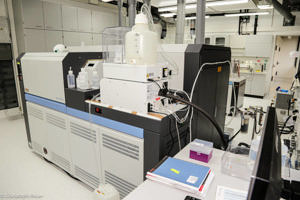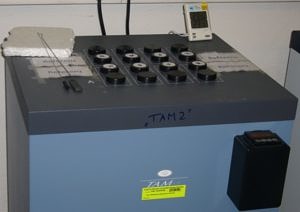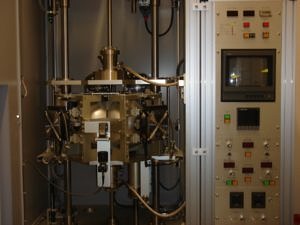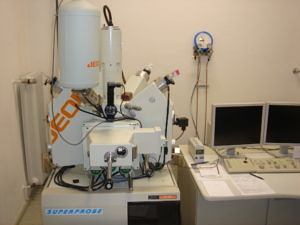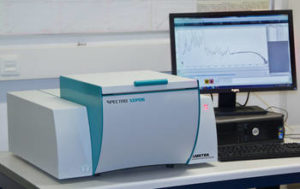Laboratory equipment
Ultrastructural analysis
Microcomputed tomography (µCT)
The microtomography system by General Electrics/Phoenix (from 2016) is installed in a seperate laboratory building. The µCT provides high resolution cross-sections of a physical objects (3D models) without destroying the original objects. Operated by the Palaeobiology section, the µCT is in use by various disciplines including material sciences, medicine and archaeology. Please contact Christian Schulbert (0049 9131 85 24851, gzn-pal-rem@fau.de) if you want to use the µCT for your own application.
Scanning electron microscopy
The scanning electron microscop by the company TESCAN from Brno (Brünn) is operated by the Palaeobiology section. Please contact Christian Schulbert (0049 9131 85 24851, gzn-pal-rem@fau.de) if you are interested in using the SEM.
Mineralogy
X-ray diffraction
Five diffractometers are available at the GeoZentrum via the research groups in Mineralogy and Endogenous Geodynamics. They allow the following applications:
- Routine analytics, high sample throughput
- Microanalytic, textures, (GADDS-system)
- kinematics (D8)
- Very small sample sizes, kinematics (D5000 with SOLX-detector)
Please find more information on the web pages of the research groups.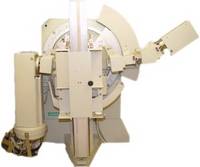 .
.
Calorimetry laboratory
Isothermal calorimetry can be used for the time-resolved investigation of cement hydration. The temperature change in the sample induced by endothermic or exothermic reactions is transferred into a heat flow signal. This allows investigating the retarding or accelerating effect of additives. The Erlangen Applied Mineralogy Group operates two commercial TAM Air isothermal calorimeters with eight twin-type channels, each consisting of a measurement and a reference channel. Find more information on the pages of the Mineralogy.
TAM Air isothermal calorimeter with eigth twin type channels (TA Instruments)
Crystal growth laboratory
The crystal growth laboratory is equipped with an optical floating-zone furnace type FZ-T-10000H-VI-FAS (Crystal Systems Inc., Japan). Single-crystals with melting points up to 2200°C and maximum diameter of 1 cm can be grown. The temperature is generated by four halogen lamps, each up to 1500 Watts. Please find more information on the pages of the Mineralogy.
Geochemistry and trace analysis
Stable isotopes laboratory for solid samples
The laboratory for isotopes provides three mass spectrometers for determining stable isotope abundances for carbon, nitrogen and oxygen in solid samples (carbonates, phosphates, sulphates and organic material).
Contact: apl. Prof. Dr. M. Joachimski
Stable isotopes laboratory for the liquid phase
The laboratory for light stable isotopes of the hydrogeology group is specialized in measurements of the liquid phase. It is equipped for measurements of stable isotope ratios of dissolved inorganic carbon (DIC), dissolved organic carbon (DOC) and particulate organic carbon (POC), and oxygen and hydrogen of water. A modified Gasbench system allows for the measurement of the oxygen isotope ratio of the dissolved oxygen (O2, DO) in water. Additionally, carbon and oxygen isotope analysis of organic material and compound specific isotope analysis (CSIA) of organic pollutants can be carried out. Routine analyses in major ions and trace elements as well as field sampling are also performed. Direct link to the Laboratories of Applied Geology
Analytical capabilities:
- δ2H and δ18O water (Picarro, Gasbench, and TC/EA liquid injection)
- δ13C-DIC and δ13C-DOC (Gasbench and Aurora 1030W)
- δ15N and δ13C-organic (bulk; Costech Elemental Analyzer)
- CSIA δ13C-organic (compound specific; Thermo GC/C III)
- δ18O-solids (TC/EA with zero blank autosampler)
- gaseous CO2 Proben (Dual Inlet and Gasbench)
- δ18O on dissolved oxygen (O2, DO) (via modified Gasbench)
- major ion analyses
- trace elment analyse
- field parameters (pH, eH, O2, alkalinity, temp., conductivity
Microprobe laboratory
The microprobe laboratory operated by the Mineralogy group includes a JEOL JXA 8200 SuperProbe with five WDS-spectrometers and EDX-system. Please find more information on the web pages of the research group.
RFA-laboratory
Metal-free clean rooms
The GeoZentrum Nordbayern is equipped with new, purpose built metal-free Class 1000 geochemistry laboratories laboratories, and state-of-the-art magnetic sector and quadrupole mass spectrometers. These instruments are used to measure the isotope composition of elements such as Sr, Nd, Pb and Hf, as well as mass-dependent isotope variations in elements such as Mo and Sr. A quadrupole ICP-MS is used to measure trace element concentrations in geological materials. We undertake work for external users, and are happy to discuss collaborative projects. Please contact Marcel Regelous (09131 8569602, Marcel.Regelous@fau.de) for more information.
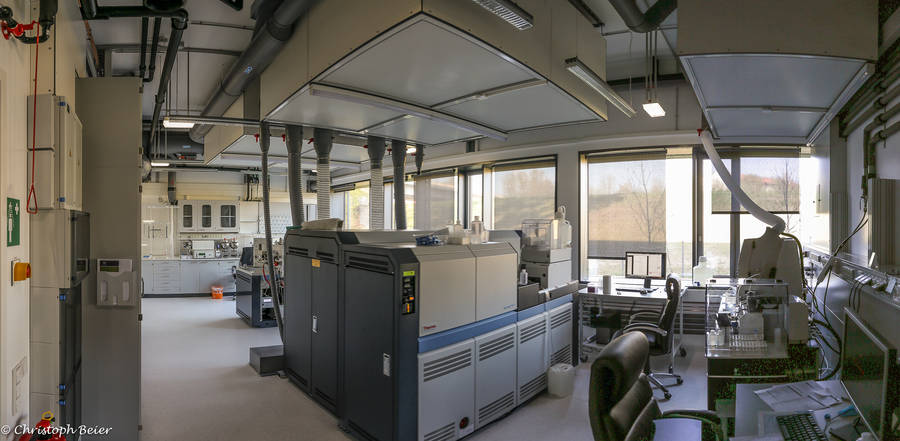
Thermal- and Plasmaionisation multicollector mass spectrometers
Our thermal ionisation mass spectrometer has 9 Faraday detectors and a secondary electron multiplier, and is used for the precise isotope analysis of small (10-100 nanogram) quantities of Sr, Nd and other rare-earth elements. Please contact Marcel Regelous (09131 8569602, Marcel.Regelous@fau.de) for more information.

Multicollector ICP-MS mass spectrometer
